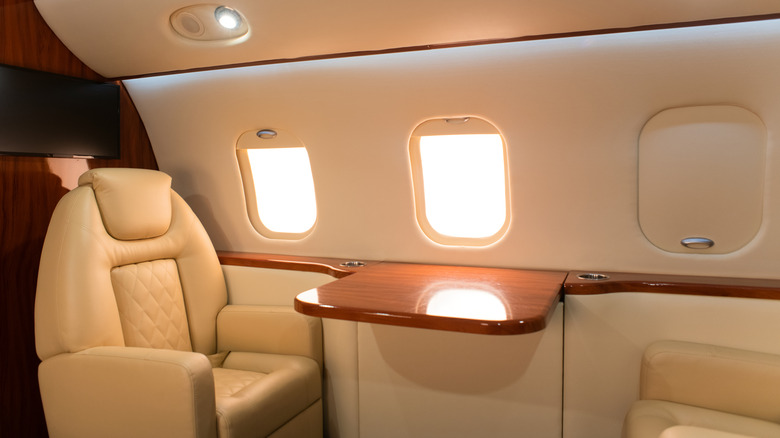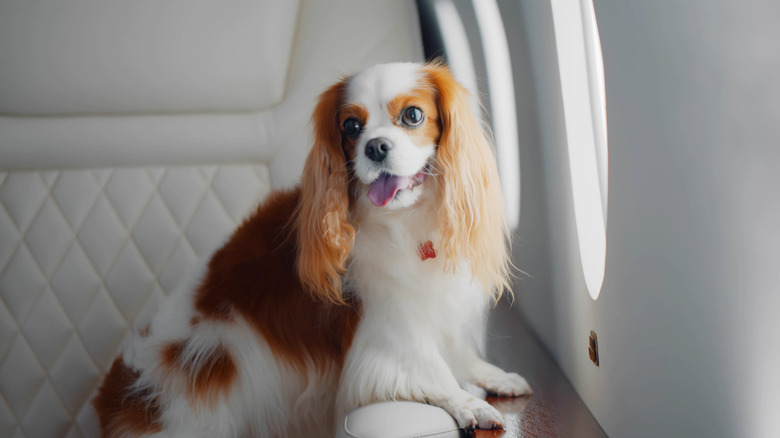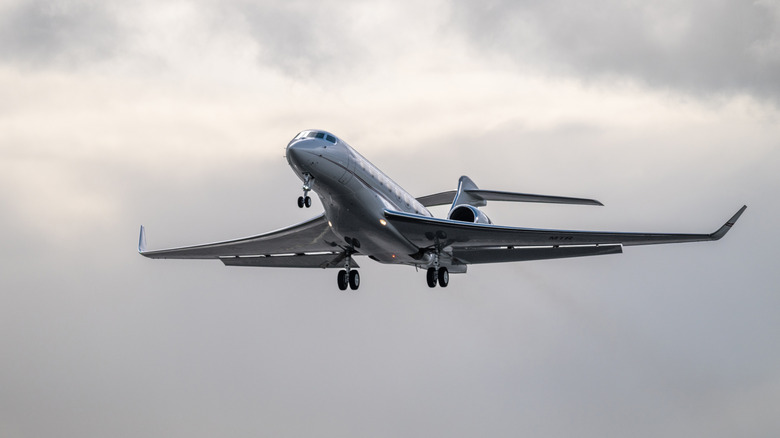You Can't Bring Anything You Want On A Private Jet And Here's Why
Those traveling by private jet still have to engage in security checks before boarding, it just takes way less time. That doesn't mean that those flying privately are absolutely free to bring along anything they wish. From musicians to sports stars and their distinguished guests, there are some things that even the wealthiest and most powerful of us are typically forbidden from bringing on a private jet.
One of the biggest and most crucial categories of banned item, whether on a private or a commercial flight, is explosives. From the likes of fireworks and beyond, these typically cannot be brought along, due to the enormous potential danger posed to all on board. The same is true of certain other extremely hazardous categories of item. Flammable objects can be banned by carriers (GlobeAir specifies firelighters and petrol as two self-explanatory examples), as can disorientating substances such as pepper spray. There is also a blanket ban on marijuana on any flight due to federal laws.
In another instance, Alpha Jet declares itself "a 'Will Not Carry' operator [...] we have strict HazMat [sic] guidelines on what we can and cannot bring on our aircraft," demonstrating that individual operator guidelines are a huge factor too. Universal Weather & Aviation Inc. notes that travelers must alert providers about the goods they're carrying or stowing and, crucially, be well aware of the permissions needed, and specific rules enforced at the associated destinations and by their customs authorities.
Just as private flyers still require passports where applicable, then, they also have to comply with a lot of the rules that govern commercial flights. This is primarily for safety reasons, as with some of the hazardous items above, but also because there are international rules that may mean something legal in one country isn't legal in another.
Private jet perks and quirks
Though private flyers are subject to some of the same restrictions, some are far less stringent. Those who have endured the challenge of arranging care for pets, for instance, will be glad to hear that they'd be welcome to bring their furry, scaled, or feathery friend along for the ride with them. Alpha Jet Charter notes that "over the years, we've flown dogs, cats, birds and parrots, reptiles, rabbits, guinea pigs, and even fish," and they have the freedom of the cabin (where practical). Up-to-date chipping and health records will be required according to where you're going, though.
Guns are another potentially dangerous category of item typically subject to strict controls. It's possible that (depending on circumstances) a private flyer may be granted permission for greater access to their firearms while in flight than somebody flying commercial. Access Jet Group warns that guarantees aren't given, and adds that "you will still be subject to regulations set forth by the FBO or airport" even if granted such. It's a tricky subject because, again, it will differ by charter company. After all, if the one you're planning to fly with doesn't have a license to carry dangerous goods, notes FXAIR, it won't be able to carry the ammo you might need for that hunting trip, whether they're ultimately legal to have on a private flight more broadly or not.
The key is to explain one's particular needs to the specific private jet operator in charge of a given flight. Different rules for different providers, plus variations with local and international laws, mean that the specifics of what passengers can bring on private jets can be very changeable. Private jets remain a safe way to travel, and part of this is ensuring that existing regulations are followed.
Local and international laws for private jets and jet operators
Regulations differ depending on jurisdictions, so it's always vital to be familiar with the laws as they apply where you're going, whether that's to a different state or elsewhere in the world. Customs regulations are never to be trifled with, and being caught out and denied entry can be potentially devastating.
There's a significant difference, of course, between outright owning a private jet and chartering one for a particular flight or series of flights. Regardless of your status as a private jet flyer, though, one thing remains true: Flights cannot simply take off from absolutely anywhere on your whim, and so they are operated by a pilot or wider operator. Whoever that may be, they are similarly subject to regulations that will restrict what's safe to bring on board.
The various permissions and clearances must be obtained, both for the country a private jet is entering and for those it might simply be passing over to reach its final destination. Ironically, a private jet flyer might find themselves becoming more familiar with these regulations and the associated red tape than commercial flyers, given the often far more personal and intimate nature of private jet travel. It's also essential to remember that not all destination airports will have the Fixed Base Operator designed for catering to such exclusive clients, highlighting that in some ways, private jet travel may not be as exclusive as you think. For example, while few of us might carry the $5 million on our person that Paramount Jets lists as the limit, money over a certain quantity must still be declared to customs. In the case of U.K. customs, for instance, £10,000 or more must be declared, in bearer bonds and other forms as well as notes itself.


